
The Leveller Tracts and Pamphlets Project
Essays | Agreements and Remonstrances | The Putney Debates | The Whitehall Debates |
Anonymous & Others | James Harrington | John Lilburne (1615-1657) | Richard Overton (1599-1664) | Edward Sexby (ft. 1642–1667) | William Walwyn (1600-1680) | John Warr (1642–1686)
Date Created: 16 October, 2020
Revised: 2 Jan. 2021
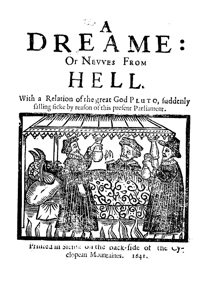 |
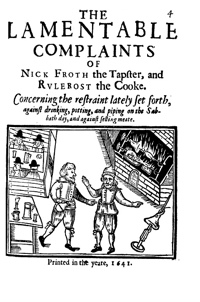 |
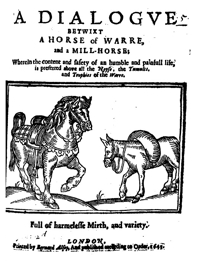 |
|
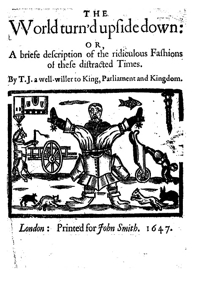 |
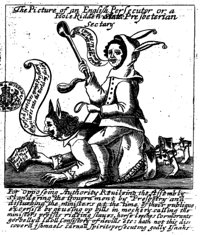 |
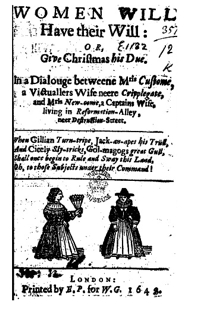 |
 |
Editing notes:
- The square brackets indicate that the pamphlet is attributed to the author.
- The pamphlets are listed by date of publication. Bibliographical information has been drawn from Thomason's Cataloueg and the work of modern scholars such as Foxley and De Krey.
- We have not attempted to modernise the spelling except for the old "s".
- We have indicated in the text when words are illegible - [Editor: illegible word].
Works consulted:
Catalogue of the Pamphlets, Books, Newspapers and Manuscripts Relating to the Civil War, the Commonwealth and Restoration, collected by George Thomason, 1640-1661, G.K. Finlayson (London: Trustees of the British Museum, 1908), 2 vols.
Biographical Dictionary of British Radicals in the Seventeenth Century, 3 volumes, ed. Richard L. Greaves and Robert Zaller (Brighton, Sussex: The Harvester Press, 1983).
See biographies of some of the leading Levellers and a few others of interest.
And, A Chronological List of My Selection of over 300 Leveller Tracts.
We also have works by some of their critics:
- T. 304 [1662.??] Thomas Hobbes, Behemoth: The History of the Causes of the Civil Wars of England (1662).
- T. 303 [1651.??] Thomas Hobbes, Leviathan, or the Matter, Forme, & Power of a Common-wealth Ecclesiasticall and Civill (1651).
Some Essays
- The Art of the Levellers - In the course of putting together a collection of over 300 Leveller Tracts I came across some very interesting title pages which used typography and occasionally woodcuts to add graphical force to the political and economic arguments being made by the authors. A selection of some of the title pages can be seen above.
- And a blog post on Thomas Hobbes' Iconography of the Leviathan State (18 December, 2020).
Agreements of the People, Petitions, Remonstrances, and Declarations (1646-1659)
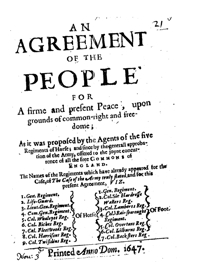 |
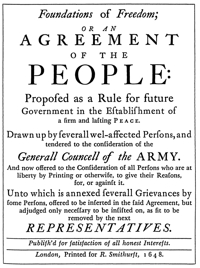 |
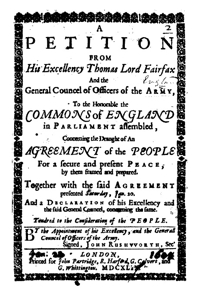 |
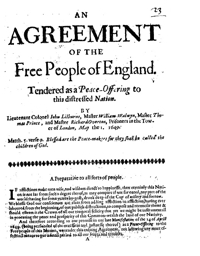 |
Four Agreements of the People:
- The First Agreement of the People (3 Nov. 1647)
- The Second Agreement of the People (15 December, 1648)
- The Officer's Agreement (20 January 1649)
- The Third Agreement of the People (1 May 1649)
Petitions of the People and the Army
- The Petition of March (1647) or The Large Petition
- The Army's Petition or "A Solemn Engagement of the Army" (5 June 1647)
- The Army's Second Petition, or The Declaration of the Army (14 June 1647)
- The Petition of 23 Nov. 1647
- The Petition of 18/19 Jan. 1648
- The Petition of 11 Sept. 1648
- The humble Petition of firm and constant Friends to the Parliament (19 January 1649)
- The Women's Petition of 5 May 1649
- The Humble Petition of Several Colonels (18 October, 1654)
Other Documents such as Remonstrances (Complaints), Declarations, and Manifestoes
- [Richard Overton], A Remonstrance of Many Thousand Citizens, and other Free-born People of England, To their owne House of Commons (17 July 1646)
- [Richard Overton], An Appeale from the degenerate Representative Body the Commons of England assembled at Westminster (17 July 1647)
- Anon., A Remonstrance of the Shee-Citizens of London (21 August, 1647)
- Anon., The Mournfull Cryes of many thousand Poore Tradesmen (22 January, 1648)
- [William Walwyn], No Papist Nor Presbyterian (21 December, 1648)
- [Several Hands], The Hunting of the Foxes (21 March 1649)
- [Several Hands], A Manifestation from Lieutenant Col. John Lilburn et al. (14 April 1649)
- Anon., The Remonstrance of the Levellers in behalf of many Thousands of the Free-People of England (21 September, 1649)
- Anon., A Declaration of the Armie concerning Lieut. Collonel John Lilburn (14 February, 1651)
- [Several Hands], The Onely Right Rule for Regulating the Lawes and Liberties of the People of England (28 January 1652)
- Anon., The Fundamental Lawes and Liberties of England (9 July, 1653)
- Anon., The Leveller: Or The Principles & Maxims Concerning Government and Religion (16 February 1659)
An anti-Leveller satire
The Putney Debates
The Whitehall Debates
[Several Hands], The Whitehall Debates (14 Dec., 1648 - 13 Jan., 1649).
Anonymous and Other Authors
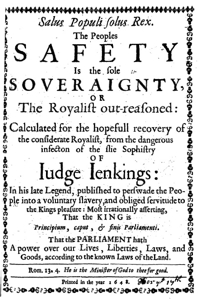 |
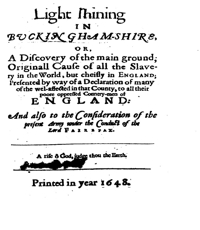 |
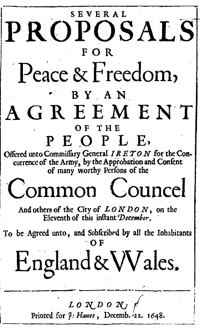 |
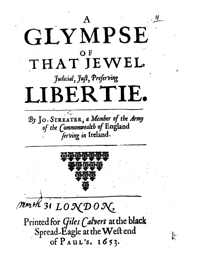 |
- Anon. Salus Populi Solus Rex. The Peoples safety is the sole Soveraignty (17 October, 1648)
- Anon., Light shining in Buckingham-shire, or a Discovery of the main ground, original Cause of all the Slavery in the world (5 December, 1648)
- John Jubbes, Several Proposals for Peace & Freedom (22 December, 1648)
- John Streater, A Glympse of that Jewel Libertie (31 March, 1653)
James Harrington (1611–1677)
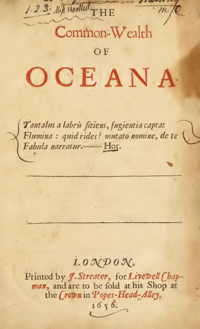 |
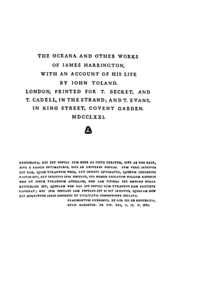 |
Biography
See the Dictionary of National Biography entry on Harrington.
Works by James Harrington
- T.308 [1656??] James Harrington, Pian Piano (1656)
- T.295 [1656.09] James Harrington, The Commonwealth of Oceana (July-Sept. 1656)
- T.296 [1658.??] James Harrington, The Prerogative of Popular Government (1658).
- T.299 (1659.??) James Harrington, Political Aphorisms (1659)
- T.309 [1659??] James Harrington, Valerius and Publicola, or the true Form of a Popular Commonwealth extracted è puris Naturalibus (1659)
- T.310 [1659??] James Harrington, The Stumbling-Block of Disobedience and Rebellion removed (1659)
- T.311 [1659??] James Harrington, A Word Concerning a House of Peers (1659)
- T.312 [1659??] James Harrington, Seven Models of a Commonwealth, or brief Directions shewing how a fit and perfect Model of popular Government may be made, found, or understood (1659)
- T.313 [1659??] James Harrington, The Ways and Means whereby an equal and lasting Commonwealth may be suddenly introduced, and perfectly founded, with the free Consent and actual Confirmation of the whole People of England (1659)
- T.314 [1659??] James Harrington, The humble Petition of divers well-affected Persons delivered the 6th of July 1659, with the Parliament’s Answer thereto (1659)
- T.315 [1659??] James Harrington, A Letter unto Mr. Stubs, in answer to his Oceana Weighed (1659)
- T.316 [1659??] James Harrington, A sufficient Answer to Mr. Stubs (1659)
- T.317 [1659??] James Harrington, Politicaster, or a Comical Discourse in Answer to Mr. Wren's Book intitled Monarchy Asserted (1659)
- T.318 [1659??] James Harrington, Pour enclouer le Canon, or the Nailing of the Enemy's Artillery (1659)
- T.319 [1659??] James Harrington, A Discourse upon this Saying, The Spirit of the Nation is not yet to be trusted with Liberty, lest it introduce Monarchy, or invade the Liberty of Conscience (1659)
- T.320 [1659??] James Harrington, A Discourse shewing that the Spirit of Parlaments, with a Council in the Intervals, is not to be trusted for a Settlement, lest it introduce Monarchy and Persecution for Conscience (1659)
- T.321 [1659??] James Harrington, A Parallel of the Spirit of the People with the Spirit of Mr. Rogers ... whether the Spirit of the People, or the Spirit of Men like Mr. Rogers, be the fitter to be trusted with the Government (1659)
- T.322 [1659??] James Harrington, A Proposition in order to the proposing of a Commonwealth or Democracy (1659)
- T.297 [1659.02.19] James Harrington, The Art of Lawgiving (20 Feb. 1659)
- T.323 [1660??] James Harrington, The Rota, or a Model of a free State or equal Commonwealth (1660)
- T.298 [1660.??] James Harrington, A System of Politics, delineated in Short and Easy Aphorisms (1660-62)
John Lilburne (1615-1657)
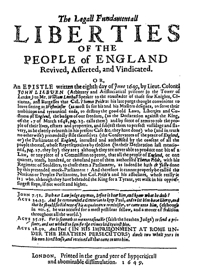 |
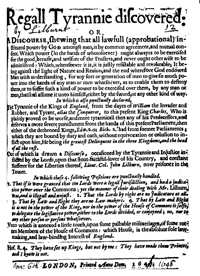 |
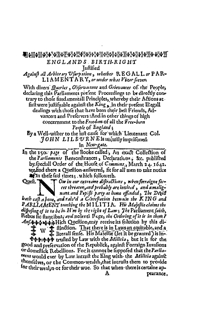 |
 |
Biography
See the Dictionary of National Biography entry on Lilburne.
Works by or attributed to John Lilburne
- [John Lilburne], Englands Birth-Right Justified Against all Arbitrary Usurpation, whether Regall or Parliamentary, or under what Vizor soever (8 October 1645).
- John Lilburne, The Free-mans Freedom Vindicated (June 1646)
- [John Lilburne], Liberty Vindicated against Slavery (August 1646)
- John Lilburne, London’s Liberty in Chains discovered (October 1646)
- John Lilburne, Vox Plebis, or The Peoples Out-cry Against Oppression, Injustice, and Tyranny (19 November, 1646).
- John Lilburne, Regall Tyrannie discovered: Or, A Discourse, shewing that all lawfull (approbational) instituted power by God amongst men, is by common agreement, and mutual consent (6 January 1647)
- John Lilburne, The resolved mans Resolution, to maintain with the last drop of his heart blood, his civill Liberties and freedomes (30 April 1647)
- John Lilburne, Jonahs Cry out of the Whales belly (26 July, 1647)
- [attributed to John Lilburne], Englands Freedome, Souldiers Rights (14 December 1647)
- John Lilburne, A Defiance to Tyrants. Or The Araignment of Two Illegall Committees (28 January, 1648)
- John Lilburne, The Peoples Prerogative and Priviledges (17 February, 1648)
- John Lilburne, The Prisoners Plea for a Habeas Corpus (4 April, 1648)
- John Lilburne, The Oppressed Mans importunate and mournfull Cryes to be brought to the Barre of Justice (Apr. 1648)
- John Lilburne, A Plea for Common-right and Freedom (28 December, 1648)
- John Lilburne, Englands New Chains Discovered (26 February 1649)
- John Lilburne, The Second Part of Englands New-Chaines Discovered (24 March 1649)
- John Lilburne, Thomas Prince, Richard Overton, The Picture of the Councel of State (4 April, 1649)
- Robert Lockier, John Lilburne, and Richard Overton, The Army’s Martyr (4 May 1649)
- John Lilburne, The Legall Fundamentall Liberties of the People of England Revived, Asserted, and Vindicated (8 June 1649).
- John Lilburne, As you Were (May 1652)
- John Lilburne, The Upright Mans Vindication (1 August 1653).
- John Lilburne, The Just Defence of John Lilburn (25 August 1653)
- John Lilburne, An Hue-and Cry after the Fundamental Lawes and Liberties of England (26 September, 1653)
- John Lilburne, The Resurrection of John Lilburne (16 May 1656)
Richard Overton (c. 1599–1664)
 |
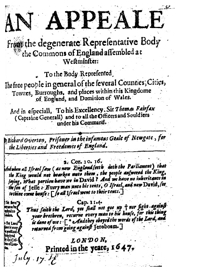 |
 |
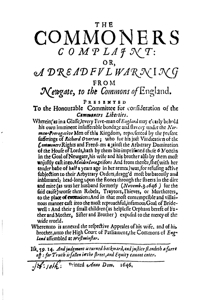 |
Biography
See the Dictionary of National Biography entry on Overton.
My bio: Richard Overton (c. 1599–1664) was one of the intellectual and political leaders of the Levellers during the English Revolution. Little is known about his early life although he probably graduated from Queens College, Cambridge and worked as an actor before becoming involved in political pamphleteering at which he excelled. He wrote dozens of pamphlets in the early 1640s in which he attacked Catholicism and the Anglican establishment. He may have been imprisoned for debt in 1642 which kept him silent for a while but he returned to the fray with a popular tract "Mans Mortalitie" (1643) in which he argued that man's soul died with him and was not resurrected until Judgement Day. Overton became close friends with William Walwyn and John Lilburne who co-authored many tracts with him.
Gradually his concerns moved from the religious to more political and philosophical matters as he developed more general theories about the equality of all men under the law, the need for Parliament to represent the interests of all citizens, the need to replace the Monarch with a republican form of government, and opposition to the system of class and political privilege which governed the British state. In addition to many individual pamphlets he also wrote editorials for the Leveller weekly journal The Moderate.
As a leader of the Leveller movement he was often singled out and imprisoned in Newgate and The Tower between 1846-47 from which he continued to write and protest, most notable of these is his "An Arrow against all Tyrants and Tyrany" (Oct. 1646) written or "fired" (as he put it) from the Newgate prison; and then again in 1649. After Cromwell crushed the Leveller movement in 1649 Overton sought exile in Holland and little is known about his activities after that date.
Works by or attributed to Richard Overton
- [Richard Overton], A Dreame, or Newes from Hell (1641).
- [Richard Overton or John Taylor], Old Newes newly Revived (June 1641).
- [Richard Overton], The Frogges of Egypt, or the Caterpillers of the Commonwealth (August, 1641).
- Richard Overton, Mans mortalitie: or, A treatise wherein 'tis proved, both Theologically and Philosophically, that whole Man (as a rationall creature) is a compound wholly mortall (19 January 1644).
- [Richard Overton], The Araignment of Mr. Persecution (8 April 1645).
- Richard Overton, Sacred Decretal, or Hue and Cry (31 May, 1645). [to come]
- [Richard Overton], The Ordinance for Tythes Dismounted, from all Mosaicall, Evangelicall, and true Magesteriall Right (29 December 1645).
- Richard Overton, Divine Observations upon the London Ministers Letter against Toleration (24 January, 1646). [to come]
- John Lilburne and Richard Overton, The out-cryes of Opressed Commons (February 1646).
- [Richard Overton], A Remonstrance of Many Thousand Citizens, and other Free-born People of England, To their owne House of Commons (17 July 1646).
- [Richard Overton], An Alarum to the House of Lords: Against their insolent Usurpation of the Common Liberties, and Rights of this Nation (1 August 1646).
- [Richard Overton], A Defiance against all Arbitrary Usurpations Or Encroachments (9 September 1646).
- Richard Overton, An Arrow against all Tyrants and Tyranny (12 October 1646)
- "An Arrow against all Tyrants and Tyrany" is his best known pamphlet and it shows both Overton's satirical and hard-hitting style of writing and the radicalism of his ideas. It begins with a typical long title which neatly summarizes his arguments, contains a mocking and irreverent place of publication in order to deceive the censors, and supporting documents to bolster his case for appeal. It then has an eloquent defence of the idea of the natural rights to liberty and property which all men have, regardless of their station in life, and is followed by two specific grievances against the growing encroachments on liberty by the House of Lords and the Presbyterian clergy, before closing with some veiled threats against what might happen to "England's Bloody Parliament" if these grievances are not remedied.
- John Lilburne [with Overton], An Unhappy Game at Scotch and English (30 November, 1646). [to come]
- John Lilburne (possibly also Overton), Regall Tyrannie discovered: Or, A Discourse, shewing that all lawfull (approbational) instituted power by God amongst men, is by common agreement, and mutual consent (6 January 1647).
- [Richard Overton], The Commoners Complaint: Or, A Dreadful Warning from Newgate, to the Commons of England (10 February 1647).
- [Overton or Lilburne], A Reall Persecution or, The Foundation of a general Toleration (13 February, 1647).
- [Richard Overton], A new found Stratagem framed in the old Forge of Machivilisme (4 April, 1647).
- [Richard Overton], An Appeale from the degenerate Representative Body the Commons of England assembled at Westminster (17 July 1647).
- Richard Overton, A New Bull-Bayting: or, A Match Play'd at the Town-Bull of Ely (7 August, 1647). [to come]
- Anon. (possibly Overton), The Mournfull Cryes of many thousand Poore Tradesmen (22 January, 1848).
- Ricard Overton, Overton's Defyance of the Act of Pardon (2 July 1649).
- Richard Overton, The Baiting of the Great Bull of Bashan (16 July 1649).
Edward Sexby (ft. 1642–1667)
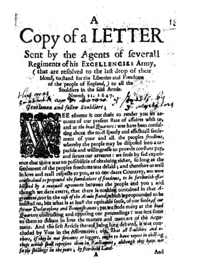 |
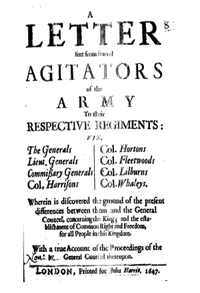 |
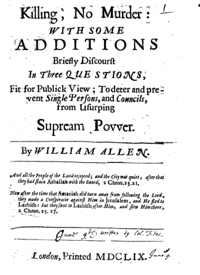 |
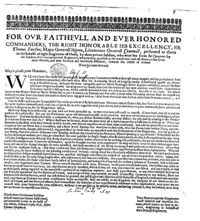 |
Biography
See the Dictionary of National Biography entry on Edward Sexby
Works by Edward Sexby
- Edward Sexby, William Allen, Thomas Shepherd, For our Faithfull and ever Honored Commanders (6 May, 1647).
- Edward Sexby, Copy of a Letter to all the Souldiers in the Armie (11 November, 1647).
- Edward Sexby, A Letter from Several Agitators of the Army to their Respective Regiments (11 November, 1647).
- Edward Sexby, Killing, No Murder (21 September, 1657).
In addition to these pamphlets Sexby was also one of the "agitators" who represented the ordinary soldiers at the Putney Debates in Oct/Nov. 1647 at whioch he made 4 recorded statements which are cited below:
Mr. Sexby.
I was desired by the Lieutennant Generall to [let him] know the bottome of their desires. They gave us this answer, that they would willinglie draw them uppe, and represent them unto you. They are come att this time to tender them to your considerations with their resolutions to maintaine them.
Wee have bin by providence putt upon strange thinges, such as the ancientist heere doth scarce remember. The Army acting to these ends, providence hath bin with us, and yett wee have found little [fruit] of our indeavours; and really I thinke all heere both great and small (both Officers and Souldiers), wee may say wee have lean’d on, and gone to Egypt for helpe. The Kingdomes cause requires expedition, and truly our miseries with [those of] our fellow souldiers’ cry out for present helpe. I thinke, att this time, this is your businesse, and I thinke itt is in all your hearts to releive the one and satisfie the other. You resolv’d if any thinge [reasonable] should bee propounded to you, you would joyne and goe alonge with us.
The cause of our misery [is] uppon two thinges. We sought to satisfie all men, and itt was well; butt in going [about] to doe itt wee have dissatisfied all men. Wee have labour’d to please a Kinge, and I thinke, except wee goe about to cutt all our throates, wee shall nott please him; and wee have gone to support an house which will prove rotten studds, I meane the Parliament which consists of a Company of rotten Members.
And therfore wee beseech you that you will take these thinges into your consideration.
I shall speake to the Lieut. Generall and Commissary Generall concerning one thinge. Your creditts and reputation hath bin much blasted uppon these two considerations. The one is for seeking to settle this Kingdome in such a way wherein wee thought to have satisfied all men, and wee have dissatisfied them—I meane in relation to the Kinge—The other is in referrence to a Parliamentarie aucthoritie (which most heere would loose their lives for), to see those powers to which wee will subject our selves loyally called. These two things are as I thinke conscientiously the cause of all those blemishes that have bin cast uppon either the one or the other. You are convinc’t God will have you to act on, butt [ask] onelie to consider how you shall act, and [take] those [ways] that will secure you and the whole Kingdome. I desire you will consider those thinges that shall bee offer’d to you; and, if you see any thinge of reason, you will joyne with us that the Kingdome may bee eas’d, and our fellow souldiers may bee quieted in spiritt. These thinges I have represented as my thoughts. I desire your pardon.
Mr. Sexby.
I see that though itt were our end, there is a degeneration from itt. Wee have engaged in this Kingdome and ventur’d our lives, and itt was all for this: to recover our birthrights and priviledges as Englishmen, and by the arguments urged there is none. There are many thousands of us souldiers that have ventur’d our lives; wee have had little propriety in the Kingedome as to our estates, yett wee have had a birthright. Butt itt seemes now except a man hath a fix’t estate in this Kingedome, hee hath noe right in this Kingedome. I wonder wee were see much deceived. If wee had nott a right to the Kingedome, wee were meere mercinarie souldiers. There are many in my condition, that have as good a condition [as I have], itt may bee little estate they have att present, and yett they have as much a [birth] right as those two who are their law givers, as any in this place. I shall tell you in a worde my resolution. I am resolved to give my birthright to none. Whatsoever may come in the way, and [whatsoever may] bee thought, I will give itt to none. If this thinge that with soe much pressing after—There was one thinge spoken to this effect—that if the poore and those in lowe condition. . . . I thinke this was butt a distrust of providence. I doe thinke the poore and meaner of this Kingedome (I speake as in that relation in which wee are) have bin the meanes of the preservation of this Kingedome. I say in their stations, and really I thinke to their utmost possibility; and their lives have nott bin deare for purchasing the good of the Kingdome. Those that act to this end are as free from anarchy or confusion as those that oppose itt, and they have the law of God and the law of their conscience [with them]. Butt truly I shall only summe uppe in this, I desire that wee may nott spend soe much time uppon these thinges. Wee must bee plaine. When men come to understand these thinges they will nott loose that which they have contended for. That which I shall beseech you is to come to a determination of this question.
Mr. Sexby.
I desire to speake a few words. I am sorry that my zeale to what I apprehend is good should bee soe ill resented. I am nott sorry to see that which I apprehend is truth, butt I am sorry the Lord hath darkened some soe much as nott to see itt, and that is in short [this]. Doe you [not] thinke itt were a sad and miserable condition that wee have fought all this time for nothing? All heere both great and small doe thinke that wee fought for something. I confesse many of us fought for those ends which wee since saw was nott that which caused us to goe through difficulties and straightes to venture all in the shippe with you. Itt had bin good in you to have advertis’d us of itt, and I beleive you would have fewer under your command to have commanded. Butt if this bee the businesse, that an estate doth make men capable to chuse those that shall represent them—itt is noe matter which way they gett it, they are capable—I thinke there are many that have nott estates that in honesty have as much right in the freedome [of] their choice as any that have great estates. Truly, Sir,[as for] your putting off this question and coming to some other; I dare say, and I dare appeale to all of them, that they cannott settle uppon any other untill this bee done. Itt was the ground that wee tooke uppe armes, and itt is the ground which wee shall maintaine. Concerning my making rents and divisions in this way—as a particular, if I were butt soe, I could lie downe and be troden there. [But] truly I am sent by a Regiment. If I should nott speake, guilt shall lie uppon mee, and I thinke I were a Covenant breaker. I doe nott know how wee have [been] answer’d in our Arguments, and I conceive wee shall nott accomplish them to the Kingedome when wee deny them to our selves. I shall bee loath to make a rent and division, butt, for my owne parte, unlesse I see this putt to a question, I despaire of an issue.
Mr. Sexby.
Truly I must bee bold to offer this one worde unto you. Truly heere was somewhat spoke of the workinges and actinges of God within them, I shall speake a worde of that. The Lord hath putt you into a state, or att least [suffered you] to run you[rselves] into such a one, that you know nott where you are. You are in a wildernesse condition. Some actinges amonge us singly and joyntlie that are the cause of itt. Truly I would intreate you to weigh that. Wee finde in the worde of God “I would heale Babylon, butt shee would nott bee healed.”I thinke that wee have gone about to heale Babylon when shee would nott. Wee have gone about to wash a Blackamore, to wash him white, which hee will nott. I think wee are going about to sette uppe the power which God will destroy. Wee are going about to sett uppe the power of Kinges, some parte of itt, which God will destroy; and which will bee butt as a burthensome stone that whosoever shall fall uppon itt, itt will destroy him.I shall propose this to your Honours, to weigh the grounds, whether they bee right, and then you shall bee led in pleasant pathes by still waters, and shall nott bee offended. I thinke this is the reason of the straights that are in hand.
William Walwyn (1600-1680)
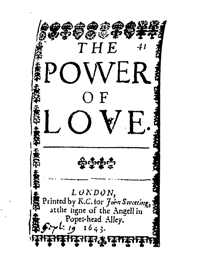 |
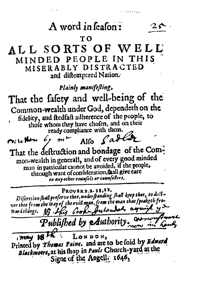 |
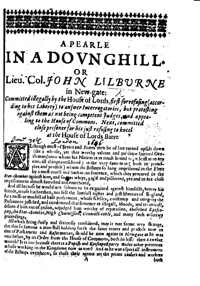 |
See the Dictionary of National Biography entry on Walwyn.
Works by William Walwyn
As a Leveller activist Walwyn was also the author or co-author of:
- The Petition of March (1647) or The Large Petition
- The Agreement of the People - The First Agreement of the People (3 Nov. 1647)
- The Second Part of Engiand's New Chains - John Lilburne, The Second Part of Englands New-Chaines Discovered (24 March 1649)
- A Manifestation (1649) - [Several Hands], A Manifestation from Lieutenant Col. John Lilburn et al. (14 April 1649)
As sole author he wrote:
- [William Walwyn], A New Petition of the Papists (September 1641).
- [William Walwyn], Some Considerations Tending to the Undeceiving (10 November 1642).
- [William Walwyn], The Power of Love (19 September 1643).
- [William Walwyn], The Compassionate Samaritane Unbinding The Conscience (June or July 1644).
- [William Walwyn], Good Counsell to All those that heartily desire the glory of God, the freedome of the Commonwealth, and the good of all vertuous men (29 July 1644).
- [William Walwyn], A Helpe to the right understanding of a Discourse concerning Independency (6 February 1645).
- [William Walwyn], Englands Lamentable Slaverie Proceeding from the Arbitrarie will, severitie, and Injustices of Kings, Negligence, corruption, and unfaithfulnesse of parliaments (11 October, 1645).
- [William Walwyn], Tolleration Justified, and Persecution Condemn’d (29 January 1646).
- William Walwyn, A Whisper in the Eare of Mr. Thomas Edwards Minister (13 March 1646).
- William Walwyn, A Word More to Mr. Thomas Edwards Minister (19 March 1646).
- [William Walwyn], A Word in Season: to all sorts of wel minded people in this miserably distracted and distempered nation (18 May 1646).
- William Walwyn, An Antidote against Master Edwards his old and new Poyson (10 June 1646).
- [William Walwyn], The Just Man in Bonds (29 June 1646).
- [William Walwyn], A Pearle in a Dounghill (23 June 1646).
- William Walwyn, A Prediction of Mr. Edwards. His Conversion, and Recantation (11 August 1646).
- [William Walwyn], A Demurre to the Bill for Preventing the Growth and Spreading of Heresie (7 October 1646).
- William Walwyn, A Parable, or Consultation of Physitians upon Master Edwards (29 October 1646).
- William Walwyn, A Still and Soft Voice From the Scriptures Witnessing them to be the Word of God (March/April 1647).
- [William Walwyn], The poore Wise-mans Admonition unto All the plaine People of London, and Neighbour-Places (10 June 1647).
- [William Walwyn], Gold Tried in the Fire, or The burnt Petitions revived (14 June 1647).
- [William Walwyn], The Bloody Project (21 August, 1648).
- [William Walwyn], A True and Ful Relation (6 December, 1648).
- [William Walwyn], No Papist Nor Presbyterian (21 December, 1648).
- [William Walwyn], The Vanitie of the present Churches (12 March 1649).
- [William Walwyn], The English Souldiers Standard (5 April 1649).
- William Walwyn, The Fountain of Slaunder Discovered (30 May 1649).
- William Walwyn, Walwyns Just Defence (June/July 1649).
- William Walwyn, Juries justified (2 December, 1650/1651).
- William Walwyn, Walwyns Conceptions; for a Free Trade (May 1652).
John Warr (1642–1686)
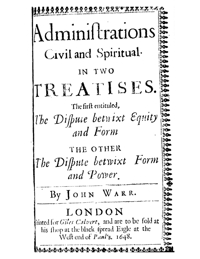 |
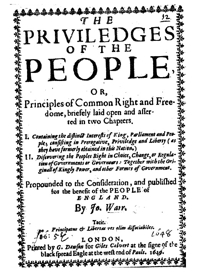 |
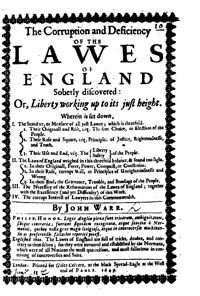 |
Bio [to come]
Works by John Warr
- John Warr, Administrations Civil and Spiritual in Two Treatises (1648).
- John Warr, The Priviledges of the People, or Principles of Common Right and Freedome (5 February, 1649).
- John Warr, The Corruption and Deficiency of the Lawes of England (11 June, 1649).